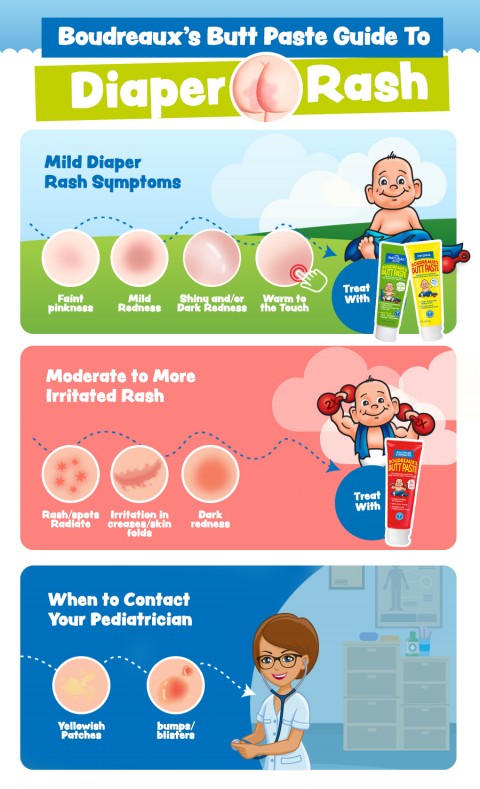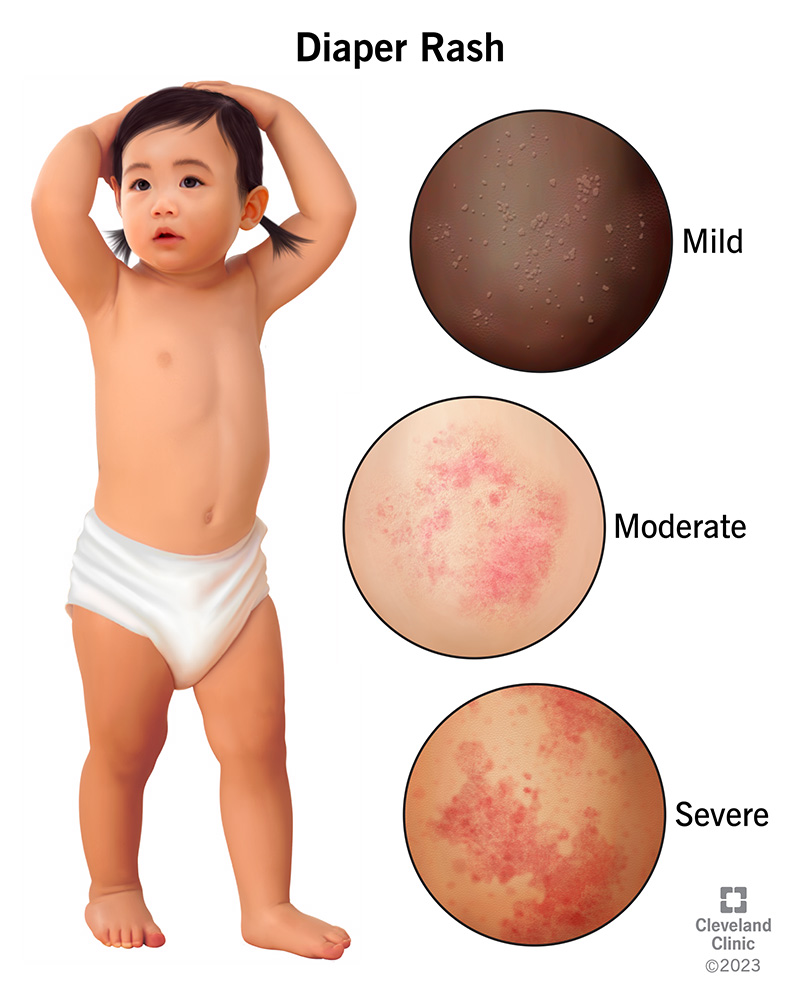Baby diaper rash with blisters appears as red, inflamed skin with raised, fluid-filled bumps. Immediate care is essential to prevent infection.
Diaper rash is common in babies and often results from prolonged exposure to wet diapers. The skin becomes irritated, leading to redness and discomfort. Blisters can form when the rash is severe, indicating a more serious condition that needs prompt attention.
Keeping your baby’s skin clean and dry is crucial. Use barrier creams and change diapers frequently to prevent rashes. Consult a pediatrician if the rash worsens or blisters appear. Proper hygiene and care can help alleviate symptoms and promote healing. Understanding the causes and treatments can ensure your baby’s comfort and health.
Identifying Diaper Rash Blisters
Diaper rash blisters can be alarming for parents. Recognizing the symptoms early is crucial. This guide will help you identify diaper rash blisters and their common locations.
Signs And Symptoms
Diaper rash blisters often appear as small, fluid-filled bumps. They may be red or slightly raised. The skin around these blisters can be tender and inflamed.
Other symptoms include:
- Redness
- Swelling
- Warmth to touch
- Discomfort or crying during diaper changes
Common Affected Areas
Blisters from diaper rash usually occur in certain areas. These areas include:
| Common Areas | Description |
|---|---|
| Buttocks | The skin can become red and blistered. |
| Thighs | Rashes may spread to inner thighs. |
| Genitals | Blisters can appear around the genital area. |
Keep these areas clean and dry to help prevent blisters. Change diapers frequently to reduce irritation.

Credit: www.huggies.com
Primary Causes Of Blistering Rash
Baby diaper rash with blisters can be alarming for parents. Understanding the primary causes can help in prevention and treatment. Below, we explore the main reasons for blistering diaper rash.
Prolonged Moisture
Prolonged moisture is a leading cause of diaper rash. Wet diapers keep the skin damp for too long. This weakens the skin barrier and leads to rashes.
Here are some key points about prolonged moisture:
- Wet diapers can irritate sensitive skin.
- Urine and stool contain chemicals that harm the skin.
- Changing diapers frequently helps prevent moisture buildup.
Bacterial And Fungal Infections
Bacterial and fungal infections can cause severe diaper rash with blisters. These infections thrive in warm, moist environments.
Below are some facts about these infections:
- Bacteria like Staphylococcus can cause blistering rashes.
- Fungi like Candida can lead to yeast infections.
- Signs include redness, swelling, and blisters.
To prevent infections:
- Keep the diaper area clean and dry.
- Use antifungal creams as prescribed.
- Consult a doctor for severe rashes.
Preventive Measures
Preventing diaper rash is easier than treating it. You need to take proactive steps to keep your baby’s skin healthy. Here are some effective preventive measures to protect your baby from painful diaper rashes that look like blisters.
Frequent Diaper Changes
Changing diapers frequently is crucial. Wet or soiled diapers can irritate the skin. Aim to change your baby’s diaper every 2-3 hours.
- Check the diaper often.
- Change it as soon as it’s wet or soiled.
- Keep a routine for diaper changes, especially after feeding and before bedtime.
Proper Cleaning Techniques
Proper cleaning is vital. Use gentle wipes or soft cloths. Avoid wipes with alcohol or fragrances.
- Use lukewarm water to clean the diaper area.
- Pat the skin dry with a soft towel. Do not rub.
- Apply a thin layer of barrier cream to protect the skin.
| Cleaning Tools | Why Use Them |
|---|---|
| Soft Cloths | Gentle on sensitive skin |
| Alcohol-Free Wipes | Prevent further irritation |
| Barrier Creams | Provide a protective layer |
Remember, keeping your baby’s skin clean and dry is key. These preventive measures can help keep diaper rash at bay and your baby happy.
Choosing The Right Diapers
Choosing the right diapers is essential to prevent baby diaper rash. Some diapers can cause blisters. Parents need to select the best diapers to keep their babies comfortable and rash-free. This involves considering materials and potential allergens.
Breathable Materials
Diapers made from breathable materials help keep the baby’s skin dry. These materials allow air to flow through the diaper. This reduces moisture and prevents rashes.
Look for diapers that use cotton or other natural fibers. These materials are soft and gentle on the skin. They also minimize the risk of irritation.
- Cotton – Soft and breathable
- Bamboo – Natural and hypoallergenic
- Hemp – Durable and absorbent
Avoiding Allergens
Some babies are sensitive to certain materials and chemicals. Allergens in diapers can cause rashes and blisters. It is important to choose diapers free from common allergens.
Check the diaper packaging for labels that indicate hypoallergenic materials. Avoid diapers with fragrances, dyes, or harsh chemicals.
| Common Allergens | Alternatives |
|---|---|
| Fragrances | Fragrance-free diapers |
| Dyes | Natural color diapers |
| Harsh Chemicals | Organic diapers |
Ensuring that diapers are free from allergens helps prevent irritation. This keeps your baby’s skin healthy and rash-free.
Effective Home Remedies
Diaper rash with blisters can be very painful for your baby. Luckily, some effective home remedies can provide relief. These remedies use natural ingredients that are gentle on your baby’s skin.
Natural Oils
Natural oils are very effective in soothing diaper rash. They can moisturize and heal the skin. Here are some oils you can try:
- Coconut Oil: It has antifungal and antibacterial properties. Apply a thin layer on the affected area.
- Olive Oil: It is very moisturizing. Rub a few drops on the rash.
- Tea Tree Oil: It has antiseptic properties. Mix a few drops with a carrier oil and apply.
Always do a patch test before using any oil. This ensures your baby is not allergic.
Oatmeal Baths
Oatmeal baths can soothe irritated skin and reduce inflammation. They are easy to prepare and very effective. Here’s how you can make an oatmeal bath:
- Grind one cup of oatmeal into a fine powder.
- Fill the bathtub with warm water.
- Sprinkle the oatmeal powder into the water.
- Stir the water to mix the oatmeal well.
- Let your baby soak in the bath for 10-15 minutes.
Pat your baby dry with a soft towel. Do not rub the skin.
| Remedy | Benefits | How to Use |
|---|---|---|
| Coconut Oil | Antifungal, Antibacterial | Apply a thin layer on the rash |
| Olive Oil | Moisturizing | Rub a few drops on the rash |
| Tea Tree Oil | Antiseptic | Mix with carrier oil and apply |
| Oatmeal Bath | Soothes, Reduces Inflammation | Soak for 10-15 minutes |
By using these home remedies, you can provide quick relief for your baby’s diaper rash.

Credit: www.healio.com
Over-the-counter Treatments
Diaper rash can be painful, especially if it looks like blisters. Over-the-counter treatments can help soothe and heal your baby’s skin. These treatments are easy to find and use.
Topical Creams
Topical creams are a common solution for diaper rash. Many contain zinc oxide, which helps protect the skin and reduce irritation. Some popular choices include:
- Desitin
- Boudreaux’s Butt Paste
- Aquaphor Baby Healing Ointment
Applying these creams is simple. Clean the affected area gently and pat it dry. Then, apply a thin layer of cream. This can help soothe the blisters and promote healing.
Barrier Ointments
Barrier ointments create a protective layer on your baby’s skin. This layer keeps moisture away, reducing the chance of further irritation. Some effective barrier ointments include:
- Vaseline Petroleum Jelly
- Triple Paste Medicated Ointment
- Weleda Diaper Care Cream
Use these ointments after each diaper change. Clean and dry the skin first, then apply the ointment. This routine helps keep the blisters from worsening.
When To Consult A Doctor
Baby diaper rash can look like blisters. Sometimes, it needs special care. Knowing when to see a doctor is crucial. This section will help you identify signs.
Persistent Symptoms
If your baby’s diaper rash does not improve after a few days, seek medical advice. Look for these signs:
- Rash lasts more than 3 days
- Blisters become bigger or more numerous
- Redness spreads beyond the diaper area
Persistent symptoms may indicate a more severe issue. A doctor can provide the right treatment.
Signs Of Infection
Blisters can become infected. Here are signs that need medical attention:
- Blisters filled with pus
- Yellow crust forms on the rash
- Fever or unusual fussiness
Infections require prompt care. Early intervention helps prevent complications. If you see any of these signs, consult a doctor immediately.
Long-term Skin Care Tips
Baby diaper rash can be a painful experience for your little one. Taking proactive steps for long-term skin care can prevent recurring issues. Below, we discuss effective strategies to maintain your baby’s skin health.
Regular Moisturizing
Keeping your baby’s skin moisturized is crucial. Use a gentle, fragrance-free moisturizer every day. Apply it after every diaper change. This helps in creating a protective barrier. It locks in moisture and soothes irritated skin.
Here is a simple routine:
- Clean the diaper area with warm water.
- Pat the skin dry with a soft towel.
- Apply a thin layer of moisturizer.
- Wait for the moisturizer to absorb before putting on a new diaper.
Choosing Gentle Products
Use products that are free from harsh chemicals. Avoid those with added fragrances and dyes. These can irritate the skin and make the rash worse.
Here are some tips for selecting products:
- Read labels to ensure they are hypoallergenic.
- Opt for pH-balanced baby wipes.
- Use mild, unscented soaps and detergents.
Consider these product types:
| Product Type | Features |
|---|---|
| Baby Wipes | Alcohol-free, fragrance-free, and hypoallergenic |
| Moisturizers | Contains natural ingredients like aloe vera or chamomile |
| Diaper Creams | Contains zinc oxide to protect the skin |

Credit: www.buttpaste.com
Frequently Asked Questions
What Causes Diaper Rash Blisters?
Diaper rash blisters are often caused by prolonged exposure to wet diapers. This can irritate the baby’s sensitive skin. Fungal or bacterial infections can also lead to blisters.
How To Treat Diaper Rash Blisters?
To treat diaper rash blisters, keep the area clean and dry. Apply a zinc oxide-based cream. Change diapers frequently and avoid using scented wipes.
Are Diaper Rash Blisters Contagious?
Diaper rash blisters are usually not contagious. However, if a bacterial or fungal infection is present, it could spread. Consult a pediatrician for advice.
Can Certain Foods Cause Diaper Rash?
Yes, acidic foods can cause diaper rash. Foods like citrus fruits, tomatoes, and strawberries can irritate sensitive skin. Monitor your baby’s diet to identify triggers.
Conclusion
Understanding baby diaper rash that looks like blisters is crucial for parents. Prompt treatment can provide relief and prevent complications. Always consult a pediatrician for severe cases. Keep your baby’s skin clean and dry. Use gentle products to avoid irritation.
Your baby’s comfort and health are the top priorities.




